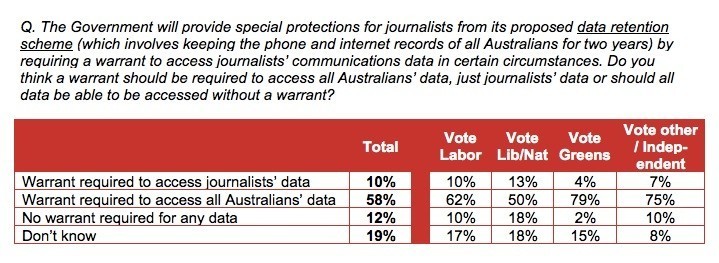As the major political parties work to impose Australia’s biggest ever mass surveillance scheme on citizens, new polling from Essential Research shows the majority of voters want law enforcement and security agencies to get a warrant in order to obtain their data.
Cowed by a media industry backlash, politicians from both major parties rushed last week to stitch up a deal to amend the government’s data retention bill to require that agencies obtain a warrant if they want to access journalists’ metadata in order to identify a source. The warrant process will be shrouded in secrecy — anyone revealing an effort to obtain a warrant, or the existence of a warrant, will be jailed for two years, and both the judge issuing the warrant and the “public interest advocate” arguing against it will be handpicked by the government — but nonetheless it imposes special requirements that will not apply to the data of ordinary citizens.
And while 10% of voters support a special requirement for journalists’ information, most voters want a warrant requirement for everyone.
Interestingly, support is strong despite voting intention. Coalition voters — who tend to be older and less IT-literate — more strongly support data retention and surveillance, but even half of them support a general warrant requirement.
There is no substantial reason why there should not be a general warrant requirement for the 300,000 telephone and internet data requests made each year by a wide variety of agencies. Police agencies insist the workload and resource requirements would be too burdensome, but a number of countries (Denmark, Spain, Finland, for example) have judicial warrant requirements for communications data; other countries like France don’t allow police to obtain data by themselves, but require that they convince a prosecutor of the need for it first.
In any event, under the government’s amendments re journalists, sources can still be hunted down if agencies don’t target journalists — and if ASIO wants to hunt down a source, it does not even need to get a warrant.









As if the politicians really care one bit what the public think…Kidding yourself if you think otherwise.
john, your grasp of what’s involved is on a par with the Crikey Collective; but a website isn’t an adequate forum for helping anyone understand why increased surveillance capacities are essential if a Nation is to protect its citizens — including those who don’t understand the threats.
Err..um..Bernard? Your articles on protecting journalist’s sources (sp) and the requirement for a warrant to access their metadata was much longer and indepth than your proposal
that Joe Public should also require a warrant before any access to their metadata.
Thanks for the after-thought.
[but a website isn’t an adequate forum for helping anyone understand why increased surveillance capacities are essential if a Nation is to protect its citizens]
Because people are afraid to speak their mind due to excessive surveillance ?
A nation should not “protect” its citizens using methods they do not approve of, and it certainly should not protect the innocent by denying them the basic human right to privacy.
Bug1, the reason “website isn’t an adequate forum for helping anyone understand why increased surveillance capacities are essential if a Nation is to protect its citizens” derives from the fact that it’s a far too complex issue than you appear to realise. It has little to do with any justified nervousness about Big Brother knowing what you think being posted on this site — unless, of course you’re thinking about carrying out terrorist attacks?
As for the extent to which a majority of voters must approve every decision Governments make, surely you’re not so naïve as to actually believe that’s a workable system? If you do, even help given face to face is unlikely to help you.